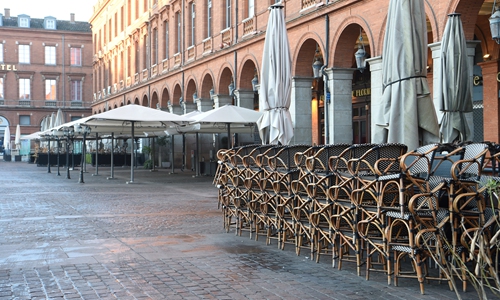Europe's lockdown late, but may yet help
By Zhao Yusha Source:Global Times Published: 2020/3/17 21:42:30
Measures won’t deliver if testing, quarantine not taken seriously: analysts

A picture taken on Sunday at the place du Capitole in the center of Toulouse, southern France showing chairs piled up as cafes and restaurants are closed amid the spread of COVID-19 Photo: AFP
Even though more and more European countries joined Italy's move of edging toward a drastic coronavirus lockdown, the continent is unlikely to effectively slow the viral spread if it continues neglecting the importance of testing and categorized quarantine, observers noted.Following on the heels of Italy, Spain and Portugal became the latest EU countries to partially seal their borders Monday. France and Germany have agreed to close their frontiers to all but essential crossings.
The EU's executive on Monday proposed a 30-day ban on incoming travel to the bloc for foreigners.
Although they came almost three months late, the drastic measures, if enforced rigorously, would help stabilize the continent's rapidly rising new infections within two months, taking an optimistic view, Peking University professor Zhang Yiwu told the Global Times.
But he pointed out that Europe's biggest loophole lies in its community management of fending off the virus. It failed to adopt strict quarantine measures to restrict the flow of people, as China did at the early stage of the outbreak, and some countries did not pay much attention to, or even ignored, the importance of testing, as well as China's experience of rounding up all who needed to be rounded up.
Not a single European country has achieved this goal, so the turning point for all of them is still hard to tell, Zhang said, noting the continent is still in its "darkest moment."
Massiamo Menditti, a doctor from Italy's worst-hit Lombardy region, told the Global Times that based on China's experience, some places in Italy should also build up makeshift hospitals to quarantine patients with mild symptoms, to prevent cross infection.
He slammed the "home-quarantine policy" adopted by other European countries, and said it won't work and will lead to family and cluster community infection instead.
Menditti noticed that although Italy has imposed lockdowns for more than a week, there are still people who secretly party in condominiums, barbecue in the countryside, and "go shopping in other municipalities because their dog only wants certain types of croquettes."
China's Wuhan has reached a tapering point after it rigorously adhered to the policy of screening and rounding up all suspected and confirmed cases and put them under categorized quarantine, said Zhang. Wuhan has seen single-digit daily increases for six consecutive days with one infection reported on Tuesday.
The World Health Organization Director General, Tedros Adhanom Ghebreyesus, said on Monday that he has a simple message to countries on how to deal with the coronavirus outbreak sweeping the globe: "Test, test, test," and urged countries to test more suspected cases, warning that they "cannot fight a fire blindfolded."
By contrast, Sweden last week announced new test routines, saying that testing will be limited to patients who are in need of hospital care or elder care and who are showing symptoms.
The UK's "herd immunity" playbook also drew a reaction from many Europeans. Many Europeans decried those actions online as irresponsible and scary moves that are likely to bring a new wave or even tsunami of new infections for Europe.
Chinese observers also noted that China's lockdown on Hubei Province was coupled by nationwide support of supplies and medical workers to the virus-stricken province. European countries sealing off, however, will add insult to injury to those countries' shortages of materials, as they are all small countries with little production.
Although the EU has adopted a travel ban on outsiders of the bloc, the effort may be undermined as members are more focused on national welfare, said Ding Chun, director of the Center for European Studies at Fudan University.
The EU on Sunday rolled out a plan for EU-wide procurement of face masks, ventilators and medical devices to encourage a bigger supply of materials, keep prices down and prevent member states from competing for equipment against each other.
However, it faces weak support as some members such as Germany banned exports of medical materials, and some countries even intercepted other countries' purchased materials, leading to infighting and deepening gaps between countries in the bloc.
Some 20 million masks the government ordered haven't arrived because other countries are blocking exports, according to the Italian government.
Chinese observers said that the outbreak may exert a heavy blow on the unity and influence of the union, which is already fragile given the rise of central-right parties in many member states.
"We do not have solidarity [in the EU], they do not feel brotherhood with those who are now in difficulty. This will open the eyes of many, I believe, and could undermine a political plan of the EU too based exclusively on the market, on the euro," Claudio Civetta, an Italian national, told the Global Times.